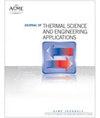An Investigation of the Thermal Performance of a Tropical Greenhouse Constructed with an Earth Air Heat Exchanger
IF 1.4
4区 工程技术
Q3 ENGINEERING, MECHANICAL
引用次数: 0
Abstract
The thermal performance of earth air tunnel heat exchanger (EATHE) integrated single span saw-tooth greenhouse was assessed in peak summer for tropical climate. With side and roof vent opened, natural ventilation due to wind and stack effect controlled the air movement and temperature inside the GH. In this configuration average temperature inside GH remained higher than the ambient temperature by 1.5 °C for the entire period of the experiment. For EATHE (installed at a depth of 3.2 m) assisted GH with polyethylene (PE) cover, the air from EATHE outlet entered inside GH at 33 °C and the average temperature within the GH was maintained at 4 °C lower than the ambient temperature. When the shading net was installed over the PE cover with EATHE, the transmitted radiations into the GH were reduced from the roof and the inside temperature was maintained 7 °C below the average ambient temperature (i.e. 45 °C). The measured temperatures along the length of EATHE were compared with the indigenously developed code-named PEAT (Performance analysis of Earth Air Tunnel) and found to be in good agreement within ± 4.5 % deviation. The temperature distribution inside the GH was predicted using a CFD model in Ansys-FLUENT with ± 5 % deviation from experimental results. With parametric analysis from the PEAT code and CFD model, desired depth of EATHE and mass flow rate of air required to bring down the GH indoor temperatures to the optimum plant growth range was determined.采用土空气换热器建造的热带温室热工性能研究
在热带气候的夏季高峰时段,对土风洞式换热器(EATHE)一体化单跨锯齿形温室的热性能进行了评价。侧和屋顶通风口打开,由于风和烟囱效应的自然通风控制了GH内部的空气流动和温度。在这种配置下,生长激素内的平均温度在整个实验期间保持比环境温度高1.5°C。对于EATHE(安装在3.2米深)用聚乙烯(PE)覆盖的辅助GH, EATHE出口的空气在33°C时进入GH, GH内的平均温度保持在比环境温度低4°C。当遮阳网安装在带有EATHE的PE盖上时,从屋顶透射到GH的辐射减少,室内温度保持比平均环境温度(即45℃)低7℃。沿着EATHE长度测量的温度与国内开发的代号PEAT(地球空气隧道性能分析)进行了比较,发现在±4.5%的偏差范围内,两者的一致性很好。在Ansys-FLUENT中利用CFD模型对GH内部温度分布进行了预测,与实验结果有±5%的偏差。通过PEAT代码和CFD模型的参数分析,确定了将GH室内温度降低到最佳植物生长范围所需的EATHE深度和空气质量流量。
本文章由计算机程序翻译,如有差异,请以英文原文为准。
求助全文
约1分钟内获得全文
求助全文
来源期刊

Journal of Thermal Science and Engineering Applications
THERMODYNAMICSENGINEERING, MECHANICAL -ENGINEERING, MECHANICAL
CiteScore
3.60
自引率
9.50%
发文量
120
期刊介绍:
Applications in: Aerospace systems; Gas turbines; Biotechnology; Defense systems; Electronic and photonic equipment; Energy systems; Manufacturing; Refrigeration and air conditioning; Homeland security systems; Micro- and nanoscale devices; Petrochemical processing; Medical systems; Energy efficiency; Sustainability; Solar systems; Combustion systems
 求助内容:
求助内容: 应助结果提醒方式:
应助结果提醒方式:


